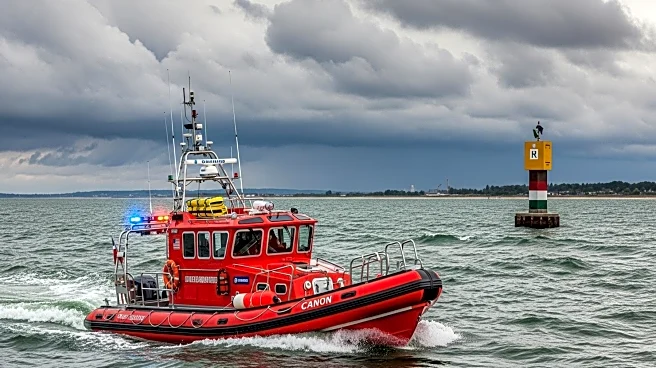What's Happening?
Recent flooding in Texas, particularly along the Guadalupe River, has highlighted the importance of cross-border collaboration in emergency response efforts. During the July 4 floods, Mexican rescue teams from Fundación 911 in Acuña, Coahuila, worked alongside officials in Kerr County, Texas, to assist in rescue operations. This collaboration underscores the shared challenges faced by communities on both sides of the border, especially in areas prone to natural disasters. Historically, the Río Grande has been a vital resource, providing water for agriculture and drinking to millions. However, it also serves as a political boundary, complicating management and response efforts during extreme weather events. The recent floods have reignited discussions about the need for better flood management systems and the role of international cooperation in addressing these challenges.
Why It's Important?
The flooding in Texas and the subsequent rescue efforts highlight the broader implications of climate change and the need for effective disaster management strategies. As extreme weather events become more frequent, the importance of international cooperation in emergency response becomes increasingly evident. The collaboration between U.S. and Mexican rescue teams demonstrates a proactive approach to managing shared environmental challenges. This event also raises questions about the adequacy of current infrastructure and policies in place to protect vulnerable communities. With rising flood insurance costs impacting home sales and property values, there is a growing need for comprehensive strategies to mitigate the effects of flooding and ensure the safety and economic stability of affected regions.
What's Next?
Looking ahead, there may be increased pressure on local and federal governments to invest in improved flood management systems and cross-border cooperation frameworks. Stakeholders, including political leaders and environmental groups, are likely to advocate for policies that address the root causes of flooding and enhance preparedness for future events. Additionally, communities along the Río Grande and other flood-prone areas may push for more equitable compensation and support in the aftermath of disasters. The ongoing dialogue between U.S. and Mexican authorities could lead to more formalized agreements on disaster response and resource sharing, potentially setting a precedent for international collaboration in addressing climate-related challenges.
Beyond the Headlines
Beyond the immediate impacts of flooding, this event highlights deeper cultural and historical connections between communities along the Río Grande. The river has long been a source of life and sustenance, and its management reflects broader themes of environmental stewardship and cultural heritage. The involvement of Mexican rescue teams in Texas underscores the interconnectedness of border communities and the shared responsibility in preserving natural resources. As discussions continue, there may be a renewed focus on integrating traditional ecological knowledge and practices into modern environmental management strategies, fostering a more holistic approach to addressing climate change and its effects.









